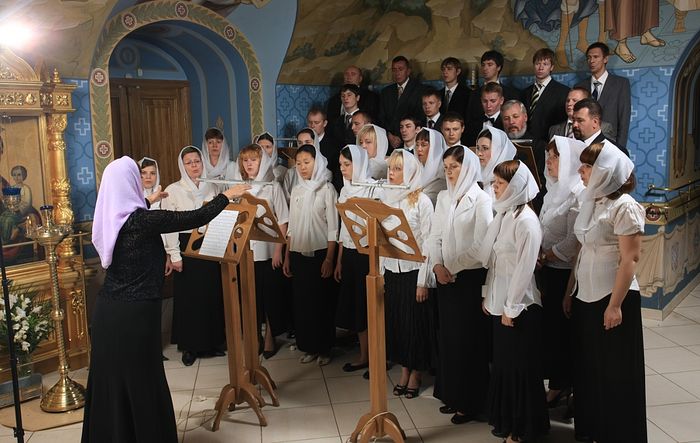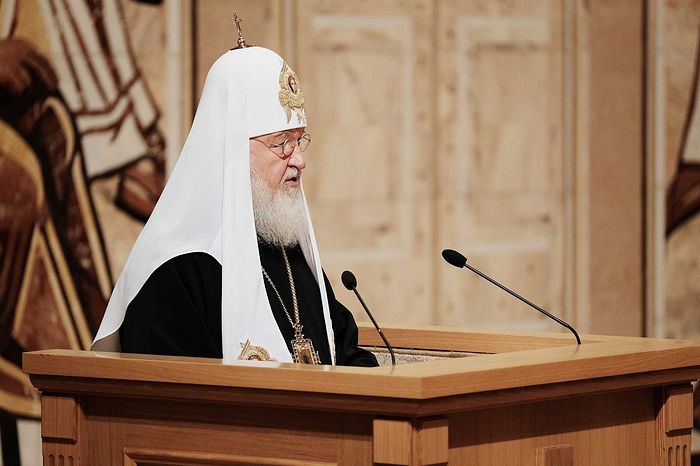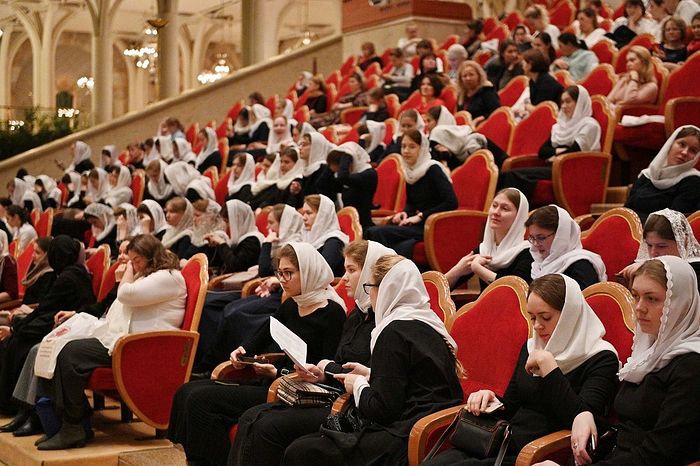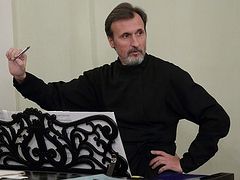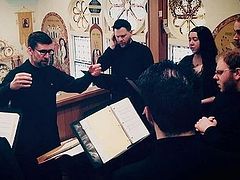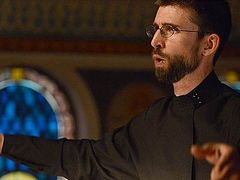Moscow, October 30, 2019
The II International Congress of Choir Directors and Singers of the Russian Orthodox Church was held in Moscow from October 24 to 26, dedicated this year to the memory of the director, composer, and author of sacred music Pavel Grigorievich Chesnokov (1877-1944), as this year marks the 75th anniversary of his death.
The conference was attended by 547 delegates from 142 dioceses of the Russian Church and 15 countries, including directors from cathedral and parish churches and monasteries and teachers of Church secular educational institutions, in additions to students from the Moscow Theological Academy and St. Tikhon’s Orthodox University in Moscow, reports the press service of the Russian Orthodox Church.
On October 24, meetings were held in the Hall of Church Cathedrals of Christ the Savior Cathedral, and on October 25 in the House of Culture of the Moscow Energy Institute.
At the opening ceremony, Archpriest Alexander Ageikin, the Chairman of the Church and Public Council under the Patriarch of Moscow and All Russia for the Development Russian Church Singing, noted that it was three years since the previous Congress, and that the number of participants had increased nearly four times over.
Patriarch Kirill of Moscow then addressed the participants with a primatial word and presented Church awards to a number of the participants in the Congress.
In his address, Pat. Kirill noted that Chesnokov is an outstanding representative of the Moscow school of composition, whose “wonderful harmonization of ancient Znamenny chants” helped to revive interest in native Russian singing and introduced whole generations to Znamenny chant.
Moreover, Chesnokov stood at the fount of the modern art of choir directing.
“Continuing the work of Chesnokov … and other prominent composers of Church music, we are called to remember that singing, revealing the beauty and spiritual meaning of worship, carries a powerful missionary potential. It is no secret that music has a great power of emotional impact on a person. The singing in church affects the aesthetic sense and can have a great impact on the soul of the listener. Church singing is truly our wealth, which we need to protect and increase,” His Holiness said.
Unfortunately, however, the choir is often not given the attention it needs and deserves in order to truly flourish and beautify our worship, Pat. Kirill continued. He also expressed his conviction that choir directors should learn Church theology, to also serve as teachers, mentors, catechists, and preachers if need be, “because it is often you, the laity, who meet those who are coming to our churches and are in need of primary catechization.”
Choir directors and singers should also be compensated with a decent wage and with respect, the Patriarch said. Every choir should have at least one professional singer who can help raise the overall level of singing, he added. His Holiness also suggested that short-term courses be arranged in each diocese and to form stable choirs that can serve as training grounds for directors and singers for other choirs.
Choir directors should be treated as one who serves in the Church, not as employees: “After all, this is our brother or our sister, who together with the priest carries out the most important service and without whom it is almost impossible to celebrate the Liturgy in such a way that this service opens the hearts of people.”
In conclusion, Pat. Kirill called on all who sing in the choir to always remember that their work has a special significance for the work of preaching Christ.
Following the opening ceremony, plenary sessions were held, focused on the life and works of Pavel Chesnokov.
At the end of the 5th plenary session on October 25, a resolution that had been drafted and adopted by the Congress was read out. It began by noting that the conference had discussed the problems and practical issues of the preservation and development of traditions of Orthodox Church singing, understanding of the liturgical typicon, and the structure of Church worship.
The 10 points adopted called for a continuation of the Congress’ work in analyzing problems in the field of liturgical music in various ways, and announced the III International Congress, which will be held in Moscow in 2022.
The Congress ended on October 26 with the Divine Liturgy for the feast of the Iveron Icon of the Mother of God at Christ the Savior Cathedral, celebrated by the Archbishop Ambrose of Verey, the abbot of Sretensky Monastery. His Eminence was concelebrated by Fr. Alexander Ageikin and a number of other priests and deacons.
The choirs were alternately directed by participants from Russia, Ukraine, Bulgaria, the United States, and other countries.
A prayer was read for the repose of the soul of Pavel Chesnokov during the Litany for the Departed. A moleben was served before the Iveron Icon following the Liturgy.
Following the service, Met. Ambrose offered an archpastoral word, in which he noted that “It is often precisely Church singing that is the most powerful sermon about Christ that our parishioners hear, thanks to which they find new meaning in their lives and the open their hearts to the preaching of the Gospel, and then never leave the saving, triumphant and most beautiful space on Earth—the Church of Christ.”

